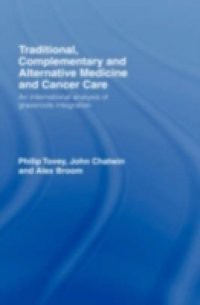Drawing on comparative fieldwork in the UK, Pakistan and Australia, this book provides the first systematic assessment of pathways and access to CAM and how it is used in health practice and by individuals with cancer. Giving fresh and invaluable insights into how differing health and societal structures influence the use complementary and alternative medicine, the book explores: the empirical, theoretical, and policy context for the study of CAM/TM and cancer the history and character of the eight support groups in which fieldwork took place in the UK, Australia and Pakistan the nature and structure of patient support groups' history, affiliation and evolution how groups function on a day-to-day basis the extent to which what is being offered in these CAM-oriented groups is in any way innovative and challenging to the therapeutic and organisational mainstream the value of sociological work in the field which is not tied to immediate and narrow policy objectives. This is an essential resource for those studying complementary and alternative medicine sociologically, to those involved in the provision of cancer care on a day-to-day basis, and to those looking to establish a more informed (evidence-based) policy.

